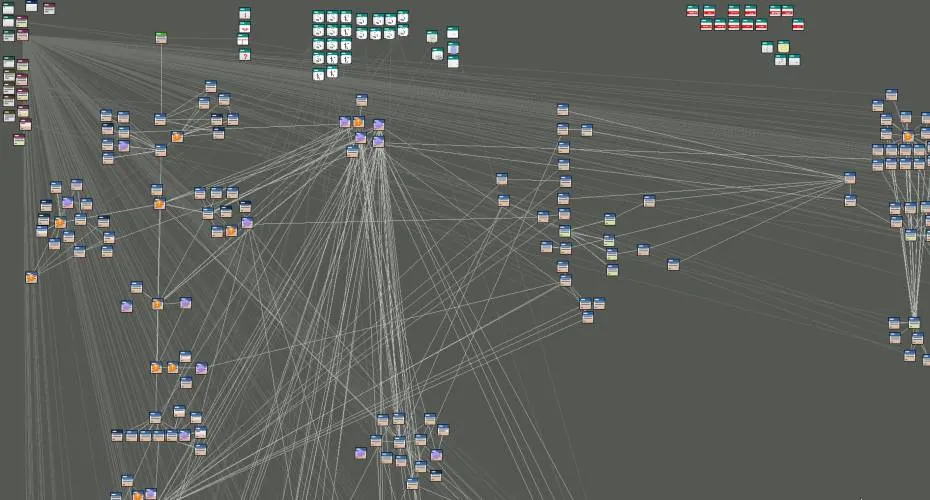Masters applications for 2023 entry are now closed.
Applications for September 2024 will open on Monday 25 September. Applications are now open for programmes with a January 2024 start. View our programmes »
| UCAS code |
1234 |
| Duration |
1 year full time
2 years part time |
| Entry year |
September 2025 |
| Campus |
Streatham Campus
|
| Discipline |
English
|
| Contact |
|
Overview
- Master the art of crafting engaging, code-driven experiences for the games industry and many others, blending narrative skills with interactive design.
- Gain sought-after skills in narrative design, UX, writing, creative coding and team-led project management, giving you a competitive edge in the job market.
- Work at the cutting edge of narrative practice, creating experiences that entertain, educate, inspire and agitate, while exploring new types of authorship across different media and technologies.
- Iteratively develop creative concepts—from design documents and storyboards to industry-standard prototypes — culminating in proof-of-concepts, MVPs and finished work for your professional portfolio.
- Enhance your skills in creative and analytical thinking, tech literacy, systems thinking, AI and data engagement.
Develop technical and creative skills in demand by employers
Varied graduate careers across many industries
Challenge-based learning combining practice and theory
Develop a strong personal portfolio of work
Develop technical and creative skills in demand by employers
Varied graduate careers across many industries
Challenge-based learning combining practice and theory
Develop a strong personal portfolio of work
Entry requirements
We will consider applicants with a 2:2 Honours degree or above in a subject that has some relevance to the precepts of the course (Creative Writing, English Literature, Narrative Theory, Game Design, Interactive Design, Media/Cultural Studies, Film, Journalism, Art, Games, Digital Media, History, Drama, Business, Design, UX/Interaction Design, Communication), and/or demonstrable professional experience in a related industry (film, television, gaming, cultural heritage etc.)
You should also submit a small portfolio of creative, story-focussed work which demonstrates your interest in the form.
Helping you to apply
You do not need to have lots of experience in games design, programming or any existing technical skills to apply for this course, but some experience of creative coding and interactive story design will be beneficial.
This could include some form of web design (using HTML/CSS), or the creation of small, simple interactive experiences using free, open-source tools such as Twine, Bitsy, RenPy, Downpour or similar. We would recommend that you explore some of these tools before you begin your studies.
Your submitted portfolio should include a short personal statement (maximum 300 words) explaining why you want to take this course and how you hope it will improve and evolve your creative practice and employability.
Your portfolio should also include between three and five examples of creative work that demonstrates your interest in interactive storytelling. These do not need to be code-driven projects but should demonstrate an aptitude and passion for storytelling in any form, and an understanding of how the opportunities and challenges of those forms inform the impact of storytelling.
Entry requirements for international students
Please visit our entry requirements section for equivalencies from your country and further information on English language requirements.
Read more
Entry requirements for international students
English language requirements
International students need to show they have the required level of English language to study this course. The required test scores for this course fall under Profile E. Please visit our English language requirements page to view the required test scores and equivalencies from your country.
Course content
The MA in Interactive Storytelling Design explores the ever-changing relationship between digital technology and narrative, preparing you to create dynamic, code-driven experiences in the video games industry and many others.
You will be introduced to the universal principles of computation and interactivity that underpin experiences as varied as video games, virtual and augmented reality, hybrid installation work, locative and immersive audio experiences and more.
You will grow your technical and creative skills while engaging with some of the key challenges and opportunities of this form. By the end of the course, you will have a strong portfolio of creative and critical work, and a wide overview of the many industries and roles into which these new skills can take you.
The modules we outline here provide examples of what you can expect to learn on this degree course based on recent academic teaching. The precise modules available to you in future years may vary depending on staff availability and research interests, new topics of study, timetabling and student demand.
Year 1: 90 credits of compulsory modules, 90 credits of optional modules
Compulsory modules
| Code | Module |
Credits |
|---|
| EASM199 |
Interactive Storytelling: Foundations and Frontiers | 30 |
| EASM203 |
Interactive Storytelling Project | 60 |
| EASM203 |
Interactive Storytelling Project | 60 |
Optional modules
| Code | Module |
Credits |
|---|
| EASM200 |
Writing Interactively | 30 |
| EASM202 |
Beyond the Screen | 30 |
| EAFM009 |
Transmedia Adaptations | 30 |
| DRAM142 |
Creative Management | 30 |
| CMMM003 |
Gaming in Everyday Life: A Global Perspective | 30 |
| CMMM003 |
Gaming in Everyday Life: A Global Perspective | 30 |
Fees
2025/26 entry
UK fees per year:
£12,500 full-time; £6,250 part-time
International fees per year:
£25,300 full-time; £12,650 part-time
Scholarships
The University of Exeter has many different scholarships available to support your education, including £5 million in scholarships for international students applying to study with us in the 2025/26 academic year, such as our Exeter Excellence Scholarships*.
For more information on scholarships and other financial support, please visit our scholarships and bursaries page.
*Terms and conditions apply. See online for details.
Teaching and research

A ‘story map’ produced in one of the most popular interactive storytelling platforms, Twine.
Teaching
Our teaching blends practical skills training and challenge-based learning with cutting-edge theory and research. You will participate in workshops, jams and hackathons. You will collaborate with peers, academics and industry experts on the iterative development of experimental prototypes and more complex projects. You will learn to transform creative ideas into tangible outcomes within a supportive environment, preparing you for future careers in diverse roles and industries.
Outside of the classroom you’ll also have access to alumni networks, a calendar of social events, lectures and masterclasses by industry professionals and discounted or free access to industry events.
Assessments
Assessment will take the form of both practical projects using a range of tools, as well as self-reflexive and self-critical statements, post-mortems and reports.
In your final term you will work on an ambitious individual or team-based project in collaboration with academic supervisors and industry mentors. You will also be assessed across the entire course through periodic review of a Course Design Journal, which documents your learning and creative development across the year. This journal will also serve as a valuable addition to your professional portfolio.
Facilities
You’ll access a range of world-leading facilities designed for creative innovation. These include technical resources like our Digital Humanities Labs, FAB LAB and Makerspace which feature capabilities for 3D printing, fabrication and audiovisual production. The Creative Quadrant provides flexible and inspirational spaces for workshopping and prototyping. For students interested in setting up their own business, we can offer exclusive access to specialists in Exeter Innovation for training, funding coaching, business advice and more.
Students will also access a range of digital assets, as well as a shared software library and a suite of the latest-generation games consoles.
Partners
Tap into our network of professional partners, encompassing game designers, design studios, interactive theatre makers, artists, industry strategists and national institutions. These collaborations play a vital role in the programme’s development, offering opportunities for partnerships, internships, teaching, lectures, masterclasses, mentoring and engaging events.
Read more

Dr. Amy Cutler
Lecturer in Interactive Narrative Design

Dr Rob Sherman
Lecturer in Digital Cultures & Interactive Storytelling
Dr. Amy Cutler
Lecturer in Interactive Narrative Design
Amy Cutler is a designer and live cinema artist who creates installations, performances, and interactive experiences.
She is a winner of the Daphne Oram award for sound art innovation, and before coming to Exeter had previously held lecturing roles in other disciplines including Game Design, English, Film, Geography, Sound Design, Art-Science, and the Creative Industries.
She has partnered with archives, festivals, and institutions including the BBC, Somerset House, Kew Gardens, The Natural History Museum, Glastonbury Festival, The Exploratorium (San Francisco) and Volta Abismal (Mexico).
Profile page
Dr. Amy Cutler
Lecturer in Interactive Narrative Design
Amy Cutler is a designer and live cinema artist who creates installations, performances, and interactive experiences.
She is a winner of the Daphne Oram award for sound art innovation, and before coming to Exeter had previously held lecturing roles in other disciplines including Game Design, English, Film, Geography, Sound Design, Art-Science, and the Creative Industries.
She has partnered with archives, festivals, and institutions including the BBC, Somerset House, Kew Gardens, The Natural History Museum, Glastonbury Festival, The Exploratorium (San Francisco) and Volta Abismal (Mexico).
Profile page
Dr Rob Sherman
Lecturer in Digital Cultures & Interactive Storytelling
Rob Sherman is an award-winning digital artist, game designer and a specialist in interactive narrative design, and a Digital Research Fellow at the British Library.
As an artist, consultant (through his design studio Bonfire Dog) and academic he has explored the boundaries of the form with partners that include The National Trust for Scotland, IKEA, English Heritage, The Alan Turing Institute, The National Museum of Wales and many others.
His past work includes virtual reality experiences, video games, web art, data-driven poetry, artificially-intelligent characters, mixed-reality apps and generative bots.
Profile page
Careers
Employer-valued skills
Our MA in Interactive Storytelling Design equips you with a robust set of skills highly valued by employers in today's competitive job market. You'll develop technical proficiency in game design, mechanics design, Agile methodologies, Unity and other development tools, rapid prototyping and UX design, alongside an introduction to a variety of programming practices.
Additionally, you’ll gain important general skills such as communication, leadership, innovation, collaborative learning, problem-solving, project management and planning.
Career paths
Graduates will thrive in creative, project-based roles where digital skills, communication, entrepreneurial creativity, collaboration in diverse teams and critical design thinking are essential.
Example roles include narrative designers, scriptwriters, journalists, experience designers, strategists, directors, producers, UX and interaction designers, AI developers, filmmakers, teachers, roboticists, digital artists, data artists, performance artists, web developers, interpreters, researchers, academics, creative technologists, community managers, entrepreneurs, and content creators.
Industries
You could work in diverse industries such as video games, immersive experiences, digital theatre, cultural heritage, performance art, film and television, design, advertising, events, journalism, politics, tourism, charities/NGOs, marketing, medicine, psychology, education and data science.
Employability
Across the course you will have access to exclusive networking events, employer talks and workshops and career development lectures. Students wishing to set up their own businesses will have access to entrepreneurial support from Exeter Innovation.
Career Zone
As a University of Exeter student, you will also have access to the Career Zone. Whatever stage you’re at, the Career Zone can help you prepare for life after university, offering quality assistance and advice throughout your course, and after graduation.
Read more















